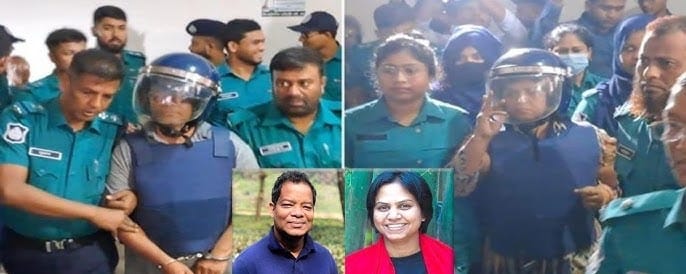Dire State of Press Freedom in Bangladesh Under Dr. Yunus’s Unelected Regime

“Bangladesh’s caretaker government, led by Nobel Peace Prize winner Mohammad Yunus, has destroyed the careers of hundreds of journalists in just the first 100 days of its rule. Bangladesh has never seen such a ferocious attack on press freedom since independence in 1971.”—Charlotte Jacquemart, senior editor, Swiss Public Radio
Since the unconstitutional change of power in Bangladesh in August 2024, press freedom has faced a myriad of challenges. Journalists have been arbitrarily arrested, charged with serious crimes such as genocide and murder, subjected to physical violence, lost their jobs and/or been forced to resign, and regularly harassed in the line of duty. Financial mechanisms are also being deployed to harass the journalists. Media houses have come under physical attack and besieged, and journalists threatened. 6 journalists have been killed, while hundreds have been attacked and injured.
Attacks on Media Houses
In the immediate aftermath of the August 5, 2024, political changeover, several media houses came under physical attack by politically motivated mobs. This resulted in the looting, vandalism, and/or arson of at least 50 offices/studios of newspapers and TV stations. However, due to the de facto immunity granted to the “protesters” by the interim government, none of these incidents of violence have been investigated and/or prosecuted. The indemnity has emboldened radical quarters, who recently besieged and attacked offices of Prothom Alo and Daily Star.
Arbitrary Arrests and False Cases
Around 600 cases have been filed across Bangladesh falsely implicating 296 journalists. Most of these cases are related to murder, attempted murder, and other serious criminal offenses such as abduction, extortion, arson, etc. It should be noted that 72 journalists in particular have been implicated in most of the cases, including charges of genocide and crimes against humanity filed at the International Crimes Tribunal-Bangladesh (ICT-BD). 18 journalists and media executives have been arrested so far. Only two of those arrested have so far been granted bail. The result of the policy of not granting bail (completely due to the political pressure exerted on the judges) is that those who have not been arrested yet are living in hiding or on the run and unable to discharge their professional duties.
Losing Livelihoods
A silent and open purge is taking place in the media landscape of Bangladesh. Journalists considered sympathetic to the Awami League, or ideologies such as secularism and other founding values of Bangladesh, are being systematically fired from their jobs or forced to resign from their positions. From Bangladesh Television (BTV) alone, around 100 reporters and journalists were fired from their jobs. 64 district correspondents were fired from BTV on the same day, violating labor laws and BTV’s service rules. Other newspapers and TV stations have also faced similar purges, with Nagorik TV firing 39 workers, Ekattor TV firing 37, DBC News firing 15, and Somoy TV firing 8. It is estimated that around a thousand journalists are currently out of work due to such politically motivated reasons.
The latest such incident was widely reported in international media when one of the coordinators of the Students Against Discrimination (SAD) Movement, Hasnat Abdullah, reportedly barged into the office of Somoy TV Managing Director and handed him a list of 10 journalists to be fired. This resulted in the management asking 5 journalists to resign.
Sieging Control of Media
Since the August 5, 2024, political changeover, the management and news editors of TV stations and newspapers have also been forcibly changed, with most TV stations and newspapers now being run by people sympathetic to political parties like the Bangladesh Nationalist Party (BNP), Jamaat E Islami (JeI), and the Students Against Discrimination (SAD) Movement. This has resulted in the media, for the most part, losing their objectivity when it comes to reporting on political affairs.
Black-Listing Journalists
Journalists are also being blacklisted in Bangladesh under the interim government through the cancellation of press accreditations, press club memberships, and financial harassment. The targeting of journalists started when, on August 10, 2024, the Students Against Discrimination (SAD) Movement handed over a list of 51 journalists they sought to ‘ban’ to the National Press Club. Since then, a total of 83 journalists (from Dhaka and other districts) have lost their memberships in the National Press Club. Lists were made by the Information Ministry too, which led to the cancellation of press accreditation cards of at least 167 journalists.
Financial Harassment
Financial harassment of journalists is also becoming a favorite tool of the current government in Bangladesh. On January 15, the central bank-run Bangladesh Financial Intelligence Unit (BFIU) sought the bank account details of 14 journalists. On January 5, financial records of 21 journalists were sought by BFIU. Previously, on December 30, November 24, October 30, and September 15, the BFIU sought details of 12, 10, 28, and 11 journalists, respectively. Thus, the central bank is now being used to harass at least 96 journalists. On November 25, 2024, 18 more journalists had their accounts frozen. All these journalists are known to be secular adherents of a particular political ideology. Hence, they are being targeted by the government using the state’s resources.
Conclusion
While Bangladesh did not have an enviable record of press freedom before August 5, 2024, the targeted persecution of journalists since August 5 has added a sinister new dimension to attacks on press freedom: wholesale implication in murder and serious criminal cases, evidentiary basis notwithstanding. Coupled with attacks on their livelihoods, credible threats of physical harm, financial harassment using state resources, and arbitrary arrests and detention, a chilling effect has descended upon the country’s media landscape. This is clear from a cursory glance at the media’s quality of reports and analysis. Self-censorship is rampant, differing voices are absent, and toeing the official line is starkly visible.
Reply